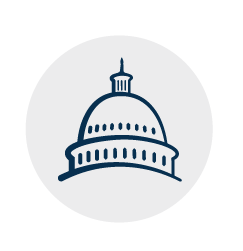Chairman Ron Wyden unveiled the Decent, Affordable, Safe Housing (DASH) Act
On August 18, 2021, Senate Finance Committee Chair Ron Wyden (D-OR) unveiled the Decent, Affordable, Safe Housing (DASH) Act, comprehensive legislation that reflects his strong commitment to addressing our affordable housing crisis. The legislation will be formally introduced when the Senate returns to session in September. We applaud his leadership on this initiative and for his ongoing support for the Affordable Housing Credit Improvement Act (AHCIA). Read Chair Wyden’s press release here.
The DASH Act includes both a tax title and a spending title. We, along with a number of our industry partners, worked closely with Chair Wyden and his staff on many of the measures in the bill. The tax title includes a number of provisions from the Affordable Housing Credit Improvement Act (S. 1136 and H.R. 2573), including the following:
Makes permanent the 12.5 percent expansion in the 9 percent housing credit and increases the annual 9 percent credit allocation and small state minimum by 50 percent – phased in over 2 years (2021 and 2022), and indexed to inflation thereafter.
Temporarily reduces the “50 percent test” from 50 percent to 25 percent for buildings financed by an obligation issued in calendar years 2021, 2022, 2023, or 2024 and placed in service in taxable years after December 31, 2021.
Provides a 30 percent basis boost for rural areas and Native American areas.
Provides a 50 percent basis boost for developments serving extremely low-income tenants and provides a separate 10% increase above the state’s annual election for those developments.
Allows state housing agencies to designate properties financed with tax-exempt bonds as eligible for up to a 30 percent basis boost.
Prohibits local approval and contribution requirements.
In addition, the tax title of the DASH Act includes the following provisions:
Creates a new Middle-Income Housing Tax Credit for developers and operators to provide affordable housing to tenants between 60 percent and 100 percent of area median income.
Allows a credit acceleration election to provide relief during the COVID-19 outbreak.
Provides a 50 percent basis boost to LIHTC buildings that dedicate space to providing supportive services.
Repeals the Qualified Contract option for taxpayers receiving LIHTC credits after December 31, 2021.
Modifies and clarifies rights related to building purchases (ROFR).
Extends the deadline for rehabilitation expenditures from two years to three following an allocation of credits.
Extends the Placed-in-Service deadline from two years to three following an allocation of housing credits, and allows an additional year for the taxpayer to incur costs equal to 10% of reasonably expected basis.
Creates a Neighborhood Homes Investment Tax Credit to encourage building or rehabilitation of affordable homes (for home ownership) in distressed neighborhoods.
Provides a refundable first-time homebuyer down payment tax credit.
Establishes a refundable Renter’s Tax Credit for property owners who rent to eligible tenants with incomes at or below 30 percent of area median income.
Provides for a study of tax incentives for conversion of commercial property to affordable housing.
Please let us know if you have any comments or questions with respect to the DASH Act. We have been in contact with Chairman Wyden’s staff regarding effective dates and on other clarifications and adjustments to the legislation, but encourage you to send us any suggestions you might have.
We look forward to working with Chair Wyden on AHCIA and DASH, and are optimistic that the upcoming reconciliation legislation will contain provisions from both. We will keep you posted on any developments. In the meantime, we are continuing to touch base with Members of Congress to ask that they cosponsor S. 1136 and H.R. 2573 (AHCIA), and hope you will do the same. Let us know if we can help in that regard.

